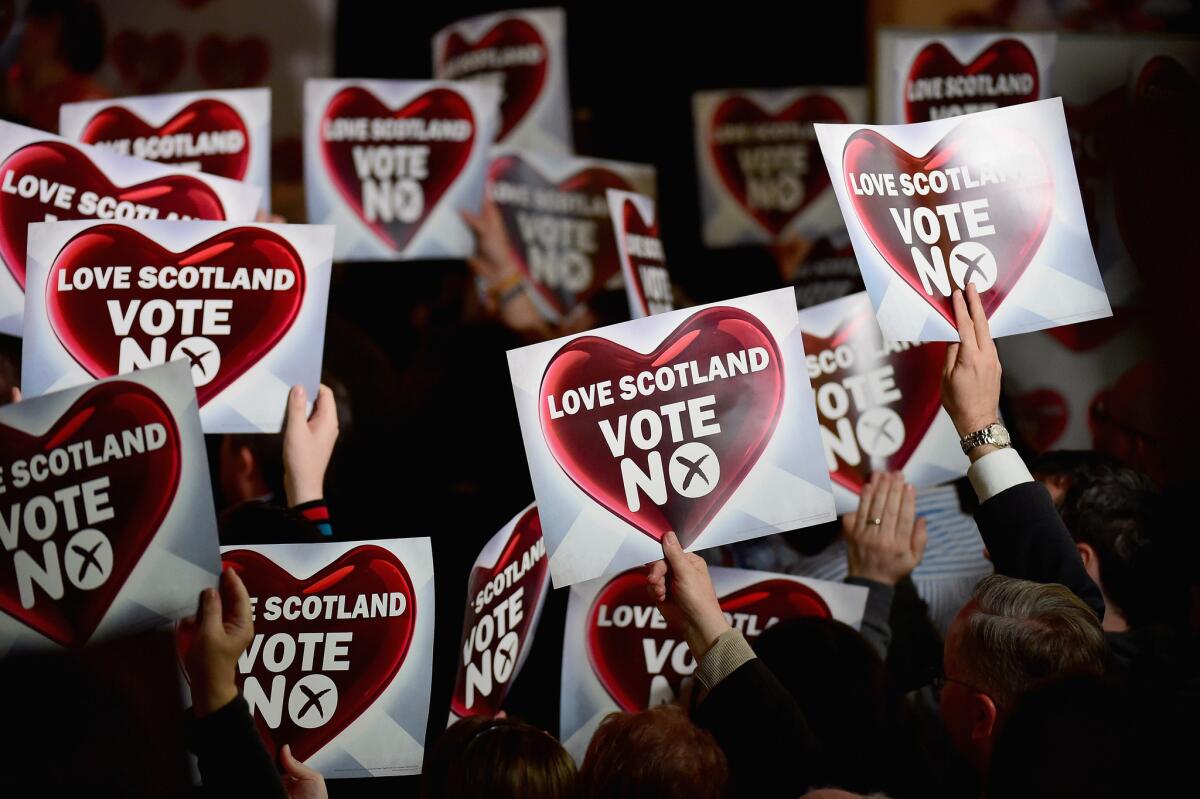Opinion: Please Scotland, don’t break up with England

Britain is on the brink. Our once solid little island is now moments away from possible extinction as Scotland prepares to vote on its future -- a referendum that will make or break a union formed more than 300 years ago.
The entire debacle has gone down like a bad breakup: England, the jilted ex-girlfriend, clinging on for dear life as our errant Scotch lover tries to extricate himself from a relationship he’s lost interest in. Scotland doesn’t want to come home to England anymore, even though there’ll be food on the table, and a warm spot in bed. He just wants to go out on the town, damn it! Make his own rules; not have to text and say he’ll be home late. And that’s cool, I guess. Except we didn’t even know there was a problem, Scotland; we didn’t feel you pulling away until you dropped the R-bomb and said you wanted it all to be over. We thought this was forever, but you clearly had other plans.
And it’s not like we haven’t been trying to win you back. We got quasi-literate national treasures like David Beckham to write you love letters. In fact, we collected a veritable litany of celebrities who essentially had nothing to do with the situation to remind you how great it was when we were together. We told you that things would be different this time around, but you’d already fallen for independence’s short skirt and stockings, and we just couldn’t measure up.
A point comes, though, where our spurned attempts at reconciliation begin mutating into anger. There are no two ways about it: Brits, or -- sorry -- the English, Welsh and northern Irish (can’t the Scots stay for the sake of brevity at the very least?!) feel downright offended that the union is on the verge of obliteration. Are we so bad, so completely and unutterably awful, that it’s worth splitting an entire nation over? Because there are no easy answers when it comes to this double whammy of dissipation and devolution: it’s unclear what currency Scotland will have, what shared property will remain theirs, how resources will be split -- we didn’t sign a pre-nup, and the constant noise from both the pro-independence Yes campaigners and their adversaries hasn’t shed any light on, well, anything. But the apparent frenzy into which so many Scots have become whipped makes it clear that they aren’t too bothered -- they just want to break away, now, and fast.
At the center of a large chunk of this anti-British feeling is Westminster, the U.K.’s White House, where the middle-aged, overprivileged white men of our fair isles gather to chitchat about their private school days and occasionally pass a law or two. The Yes campaign has made it clear that it has had enough with this London-centric policy making, and as the electoral statistics show, Scotland’s largely left-wing voting populace doesn’t particularly want to be saddled with another Conservative term.
Isn’t that a bit selfish though, Scotland? Because here in London, we don’t particularly want to be saddled with another Conservative term, either. The figures for each region speak for themselves: in the north of England, people vote Labor; in the south, the opposite (with the exception of the capital) -- but isn’t that the nature of democracy? We agree to go with the majority knowing that we may not get the result we want, and promise not to start misbehaving when things don’t go our way. If our itty bitty island was pretty small to start off with, who knows what infinitesimal portion will remain now that the divide-and-rule mantra has fallen back in favor.
This period of international strife, too, seems an especially troublesome point at which to be dicing up a kingdom. And it’s also having knock-on effects around the world, with Catalonia now eager to split off from the rest of Spain, and rumors that other English regions will follow in an independent Scotland’s footsteps should the Yes vote win.
If there are real benefits to be had by countries or provinces going it alone, then perhaps they should do it, but splintering off on the basis of some sham-idealism that has no grounding in reality is nothing more than an exhausting publicity stunt. The politicians who make the biggest promises and rouse the greatest amount of chatter are scarcely those who deliver, and Scottish National Party minister Alex Salmond looks guilty of exactly that. It’s not entirely clear what his policies are on anything, really, but people have become so excited by a referendum they didn’t know they wanted that nobody seems to care. Add to this the reams of uninformed voters casting their ballots with scant research into the situation, and we have one hell of a mess on our hands.
With the polls flitting from one outcome to another on a daily basis, the time has come to sit back and just accept whatever result is reached. Should the No voters win, we’ll take you back, Scotland. But next time around, we may not be so forgiving.
Charlotte Lytton is a London-based journalist, and has previously written for CNN, The Daily Telegraph and The New York Observer. Follow her on Twitter @charlottelytton
Follow the Opinion section on Twitter @latimesopinion
More to Read
A cure for the common opinion
Get thought-provoking perspectives with our weekly newsletter.
You may occasionally receive promotional content from the Los Angeles Times.






